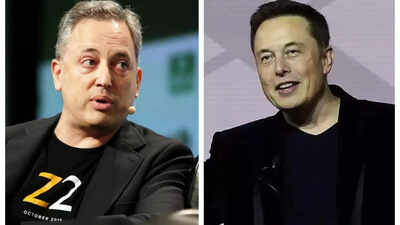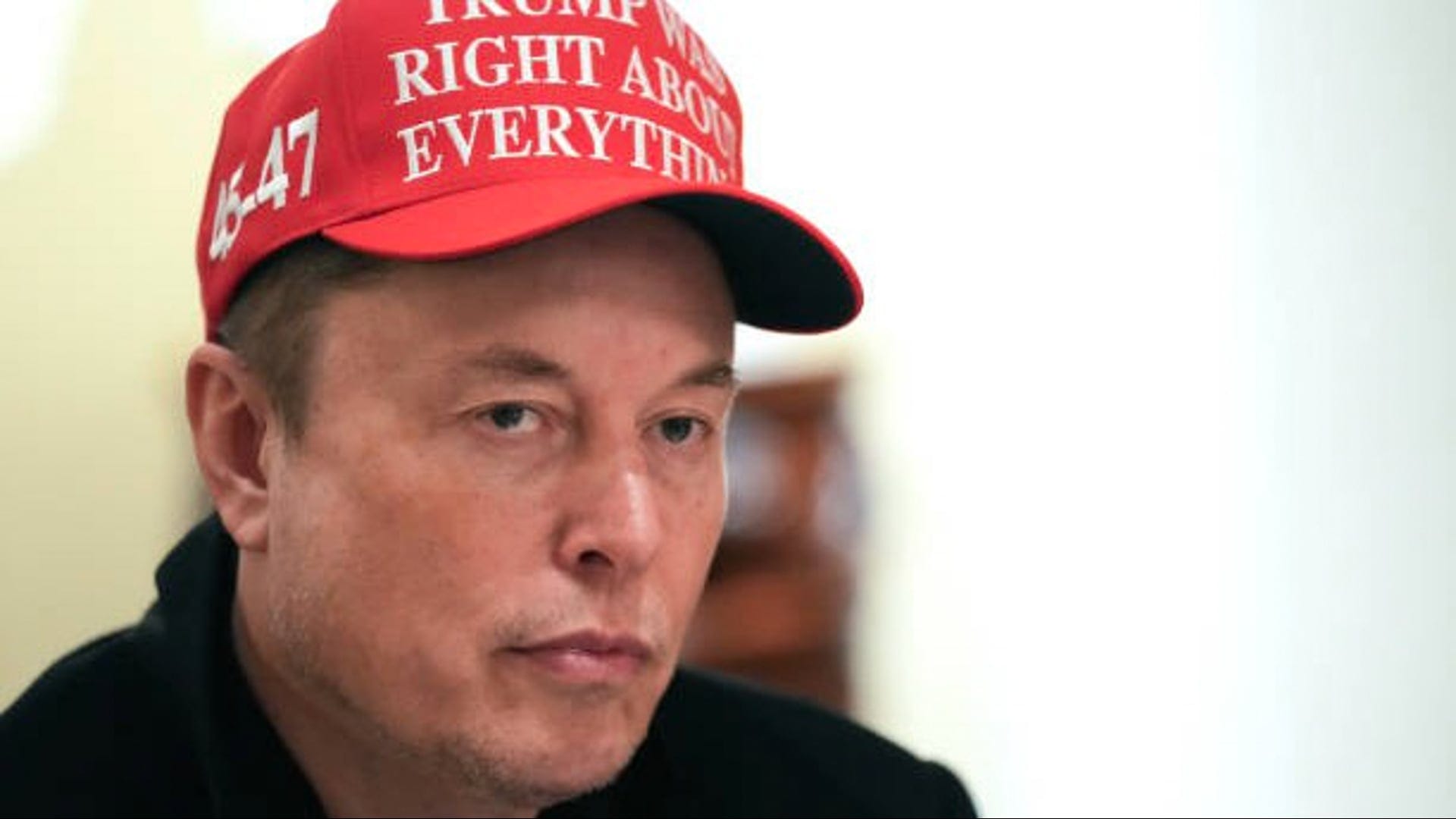Elon Musk pauses Tesla orders in China amid trade war
Tesla has paused new orders for its Model S and Model X vehicles in China, following the US decision to impose 145% tariffs on Chinese imports. The move signals early fallout from President Trump’s escalating trade war.
unbranded – Newsworthy
When Steve Riabov started his Silicon Valley construction company six years ago, his hero was another business entrepreneur: Elon Musk.
Riabov thought if he modeled his home kitchen and bathroom remodeling business after the “bold, adventurous, and daring” tech leader, it would help his company blossom into a multi-million-dollar home-building enterprise. So he named his firm Musk Construction.
But in recent months, Riabov, 35, has become disillusioned with his idol, who has metaphorically and literally taken a chainsaw to the federal government as head of President Donald Trump‘s Department of Government Efficiency. Riabov, a native of Ukraine, was also deeply upset by Musk’s recent comments about his home country.
So, he’s now committed to purging Musk from Musk Construction ‒ even though it will cost him between $15,000 and $20,000 to get a new company trademark and permits. And he’s already removed the Musk Construction logo from the company’s red Tesla vehicles, along with the vanity plates, “MUSK UP” and “MUSK INC.”
“I can’t stand it,” Riabov told USA TODAY. “I no longer align with all of his values. I have to change the name.”
What’s in a name?
It’s not clear how many other entrepreneurs named their companies after Musk when he was building a reputation as a national hero. So, it’s not clear whether others, like Riabov, are now having second thoughts.
But clearly, Musk’s reputation has changed since the days when he was valorized as the man who became the richest in the world by leading Tesla and SpaceX and co-founding the online payment site PayPal.
Recent polling shows many Americans now have an unfavorable opinion of Musk, whoalso owns or co-founded the social media site X (formerly Twitter), Neuralink, which is developing implantable brain-computer interfaces, the artificial intelligence company xAI, and The Boring Company, which provides tunneling technology ‒ none of which he named after himself.
Now, with sales slowing and even some clients who signed contracts backing out for fear of possible affiliation with Musk, Riabov feels the association is hurting rather than helping his company’s bottom line.
Telsa tanking?: Tesla profits plummet 71% amid backlash to Musk’s role with Trump administration
“I’ve come too far to stop now,” Riabov said about the name change. “There’s no going back. Too many people are relying on me.”
Musk, whom Riabov has never met, did not respond to a request for comment.
One expert who researches the interaction between corporations and political actors said Riabov’s decision to change his company’s name makes sense.
Strategic decisions matter, especially in the face of economic conditions facing downturns,” said Dinesh Hasija, a business professor at Augusta University in Georgia. “As long as your company name aligns with its core values, strategic vision, and your customers’ values, it’s more likely to pay off.”
‘This is a revolution’: Musk shrugs off DOGE criticism, defends department
Path to an idol
In 2014, Riabov was living in Luhansk, Ukraine, when he said the Russian military invaded his hometown as part of the Donbas invasion.
Riabov said he was kidnapped on suspicion of being a spy for Ukraine and spent two weeks being tortured in a basement. He shakes his head while recalling the situation and grabs a copy of his self-published autobiography, “Hitchhiking To A Million – The Story of Ukraine Refugee,” where he wrote about the experience, for support.
He pauses, collects himself, and quickly says, “I saw people die in there. I could’ve died in there and my dreams would’ve died with me. With his mother’s help in identifying him, the kidnappers eventually released him.
‘Vladimir, STOP!’: Trump chides Putin for Russia’s deadly attack on Ukraine amid push for peace deal
Riabov fled Ukraine with his then-girlfriend, an English teacher, as 2015 approached. They hitchhiked through Russia, Belarus, Kazakhstan, China, Laos, Cambodia, Malaysia and Thailand.
They applied for tourist visas to the United States. With financial help from friends and family, the couple hitchhiked back to Malaysia and flew to Los Angeles with only $70 between them when they arrived in America, Riabov said.
“We were naive, but determined to make a life for ourselves,” he said.
After sleeping on the streets for two weeks in L.A., they hitchhiked north to San Ramon, California. There, they applied and were granted political asylum, making them eligible to work.
For the next two years, Riabov, who spoke limited English, toiled as a handyman doing odd jobs in the area, living in his boss’s garage, to save money, Riabov said.
His English improved by reading books and listening to audiobooks on creating businesses and biographies about entrepreneurs like Steve Jobs and Richard Branson. But he gravitated toward “Elon Musk: Tesla, SpaceX, and the Quest for a Fantastic Future,” by Ashlee Vance.
“Musk’s drive was motivating,” Riabov said. “He was determined to build things on Mars, and I was like, ‘He’ll need some help. Why can’t it be me?’”
Riabov applied for a Limited Liability Company (LLC), and by 2019, formed his construction company in San Jose, and chose to name it in honor of Musk.
“I figured out it should be something sharp, interesting, inspired and focused,” Riabov, who attained American citizenship last year, said somberly. “I thought it was a good idea.”
Using Musk’s name became ‘bad for business’
But late last year, Riabov began to worry the Musk name might be “bad for business,” as the entrepreneur became more entrenched with Trump’s presidential campaign.
Riabov said that it became too much for him and his staff in February when Musk supported Trump’s public dressing down of Ukrainian President Volodymyr Zelenskyy and blamed Zelenskyy for Russia’s 2022 Ukrainian invasion.
Riabov was further incensed when Musk described Sen. Mark Kelly, D-Ariz., as a “traitor” over his support of Ukraine and called for the termination of all U.S. aid to the country.
“I almost cried, it’s so insane,” Riabov said. “Ukraine is trying to survive, and now America is taking such a different stance.”
‘Everybody’s to blame’: Trump accuses Zelenskyy of starting Russia’s war on Ukraine
Then, Musk Construction sales representative Anthony Khrypchemko told him a client they had signed for a major bathroom remodel backed out.
“We had the paperwork signed and everything, but they saw an online interview of Steve praising Musk from about six, seven years ago, and because of that, they said ‘We’re not going with you guys,’” Khrypchemko said.
The company’s overall sales have been well in the seven figures for the past two years, but now they’re “a bit on the slower side,” Khrypchemko said.
Riabov said the company doesn’t know how much potential business it may have lost due to its name. He asked his staff, which includes workers in Silicon Valley and across Ukraine, Poland, Germany, Georgia and Portugal, if they should rename it.
They said yes, without hesitation and unanimously voted to rename the company, RISE Construction.
“It became really necessary to disassociate. Musk used to be our inspiration, whose ideas were so amazing, progressive and inspiring,” said Sofie Rokishchuk, Riabov’s assistant who works remotely from Ukraine. “But that’s all changed. It’s crucial for us, as Ukrainians, to present a strong and united front. To let everyone know we don’t stand by (Musk’s) ideology.”
Riabov said the challenge remains convincing clients that his construction company, which now includes building new homes, provides quality work.
“We haven’t heard anybody tell us we should stick with the old name,” Riabov said. “That’s a plus for us.”
















